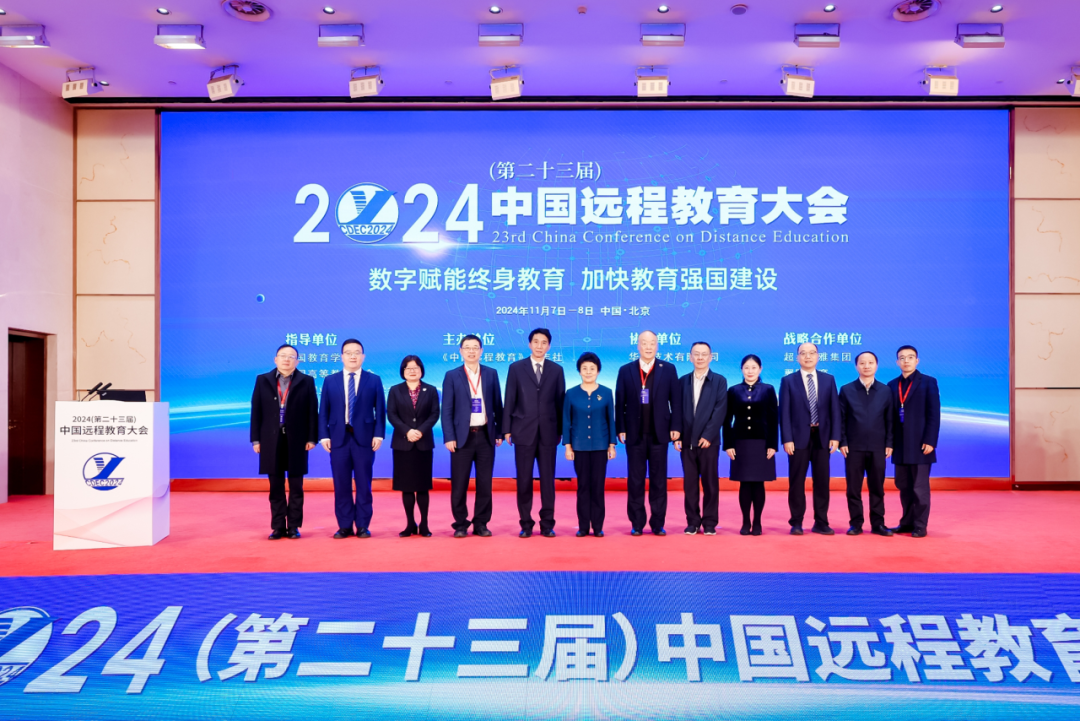 Forge ahead for the dream of a strong nation and set sail on a new journey. On 7 November 2024, the 23rd China Conference on Distance Education was successfully launched in Beijing under the theme “Empowering Lifelong Education through Digitalisation, Accelerating the Construction of a Leading Country in Education.”
Forge ahead for the dream of a strong nation and set sail on a new journey. On 7 November 2024, the 23rd China Conference on Distance Education was successfully launched in Beijing under the theme “Empowering Lifelong Education through Digitalisation, Accelerating the Construction of a Leading Country in Education.”
The conference aims to further implement the guiding principles of the 20th National Congress of the Communist Party of China (CPC), the Third Plenary Session of the 20th CPC Central Committee, and the important speech by President Xi Jinping at the National Conference on Education. It seeks to advance education development, technological innovation, and talent cultivation in an integrated manner, while exploring new ideas and approaches for empowering lifelong education through digitalisation and accelerating the construction of a leading country in education. Participants engaged in in-depth discussions and exchanges on the theme of digitalisation in education and lifelong learning, covering various dimensions such as top-level design, scientific concepts, and practical exploration.
This conference was guided by the Chinese Society of Education, China Association of Higher Education, Chinese Society for Technical and Vocational Education, China Adult Education Association, China Association for Educational Technology, and the OUC. It is hosted by Chinese Journal of Distance Education and co-organised by Huawei Technologies Co., Ltd. Attendees included guests from continuing and adult education colleges of universities nationwide, the open university system, vocational institutions, and industry enterprises.
The conference reached the following consensus: The development of education supported and led by digitalisation in education is an inevitable trend, a development need, and a direction for reform. It is essential to empower education through digitalisation, driving iterative innovation in education and restructuring the talent cultivation system driven by digitalisation. It is essential for education to enhance total factor productivity, align with the new wave of technological revolution and industrial transformation, guide the all-round development of students, and promote social progress on all fronts. It is essential to build a more resilient and human-centred high-quality education system and a new educational ecosystem.

The conference was attended by leaders such as Lin Huiqing, vice president of the China Association of Higher Education and former vice minister of the Ministry of Education (MOE); Wang Qiming, secretary of the Party Committee and president of the OUC; Liu Jiantong, vice president and secretary-general of the Chinese Society for Technical and Vocational Education; Gao Dongfeng, deputy director-general of the MOE’s Department of Higher Education; Zou Hui, deputy director-general of the MOE’s Department of Science, Technology, and Informatisation, as well as university and college leaders from the OUC and various provincial open universities, leaders from various continuing education and vocational colleges in universities nationwide, and middle and senior level managers from industries.
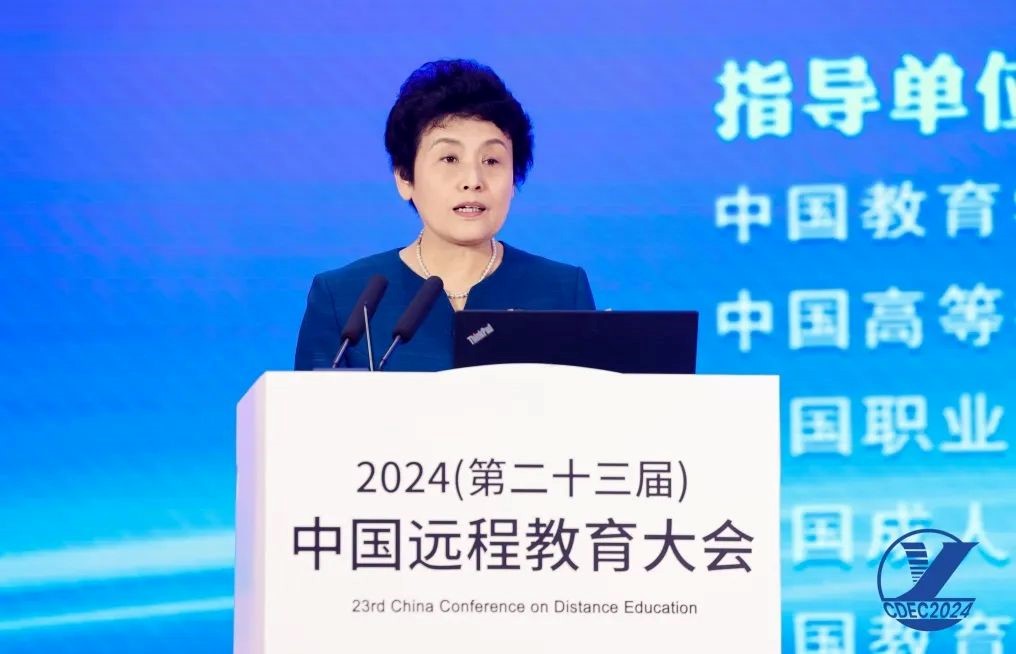
Lin Huiqing, Vice President of the China Association of Higher Education and Former Vice Minister of the MOE
Lin Huiqing, vice president of the China Association of Higher Education and former vice minister of the MOE, stated in her speech that the digitalisation of higher education is an inevitable trend, a development need, and a direction for reform. She emphasised the importance to seize opportunities by gaining a deep understanding of the significance of the digital transformation in education, accelerating the construction of new educational infrastructure, greatly enhancing the digital literacy and competence of teachers, promoting educational equity through higher education digitalisation, and expanding international exchanges and cooperation in digital education. These measures will help accelerate the construction of a networked, digital, and lifelong education system, driving China’s systematic leap from a major country in education to a leading country in education.

Wang Qiming, Secretary of the Party Committee and President of the OUC
Wang Qiming, secretary of the Party Committee and president of the OUC, delivered a welcome speech. He reflected on the university's achievements over its 45 years of operation and introduced its future development plans. Over the past 45 years, the OUC has helped 19.61 million people realise their dream of attending university, making an irreplaceable historical contribution to China’s economic and social development. Looking ahead, the university plans to enhance and improve the quality of open education, expand and strengthen the seniors university, and explore the creation of a digital university. It will serve the construction of a learning society and country, and build the development framework for open education and a learning society. The OUC is committed to serving the national strategy on aging, trying to make the SUC a “main channel” for elderly education, a “strong guide” for proactive health, and a "catalyst" for the silver economy. Aligned with the national digital education strategy, it plans to build a digital education foundation supported by artificial intelligence and big data technologies, fully advance digital transformation, and innovate the development of large-scale, personalised, and high-quality new lifelong education paradigms. It will empower lifelong education through digital means to serve the construction of a learning society and country.
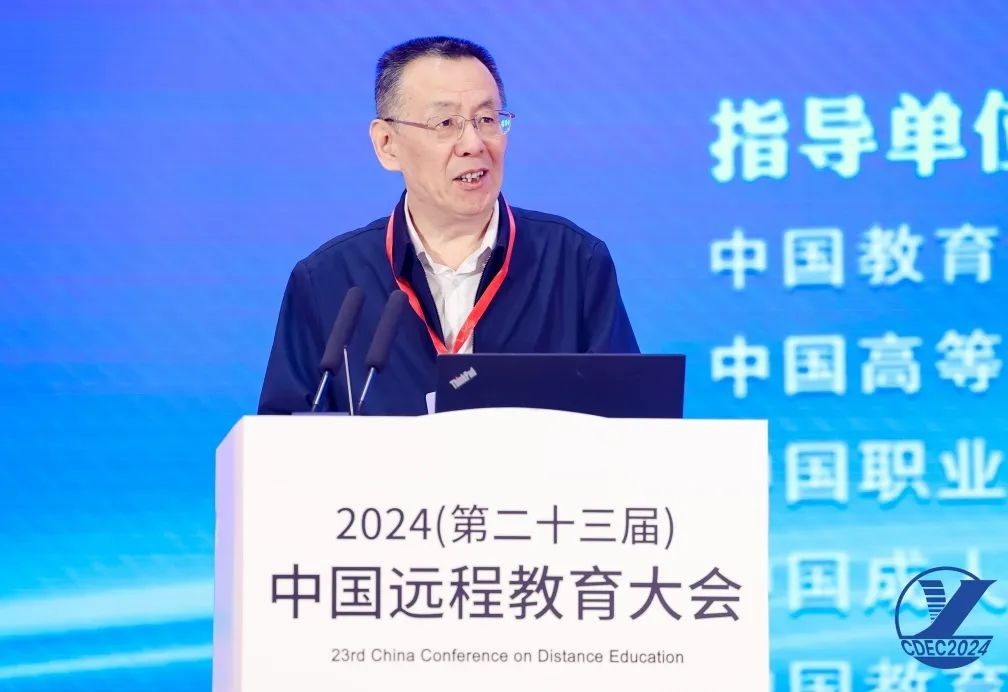
Liu Jiantong, Executive Vice President and Secretary-General of the Chinese Society for Technical and Vocational Education
Liu Jiantong, vice president and secretary-general of the Chinese Society for Technical and Vocational Education, delivered a speech. He pointed out that in-depth discussions on new concepts, ideas, and measures for empowering lifelong education through digitalisation are of great significance in better facilitating the construction of a leading country in education. He stated that the digitalisation of education provides new opportunities for the reform and innovation of vocational education, and that the Chinese Society for Technical and Vocational Education is fully engaged in the reform and construction of a modern vocational education system across all areas.
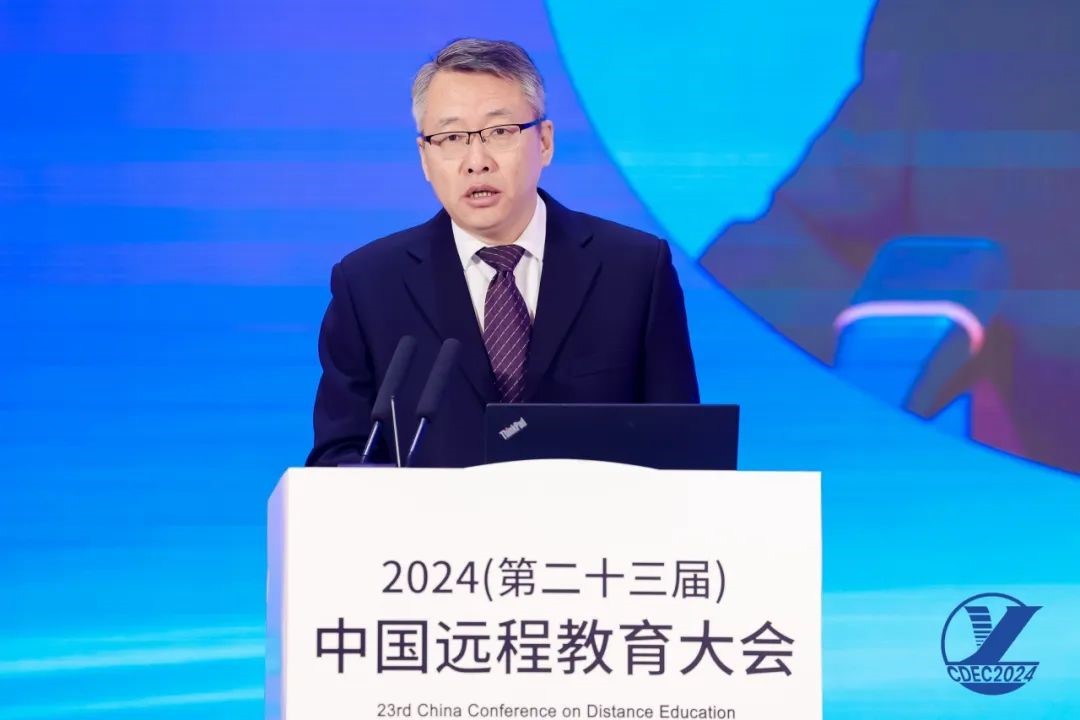
Gao Dongfeng, Deputy Director-General of the MOE’s Department of Higher Education attended the conference and delivered a speech.
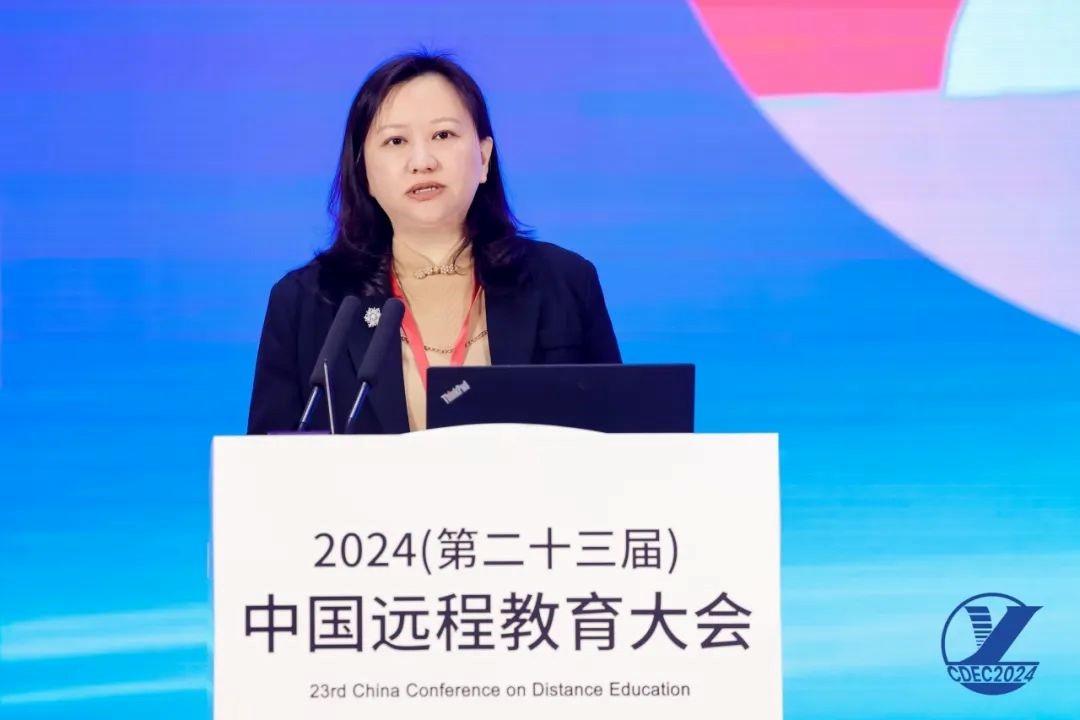
Zou Hui, Deputy Director-General of the MOE’s Department of Science, Technology, and Informatisation
Zou Hui, deputy director-general of the MOE’s Department of Science, Technology, and Informatisation, pointed out in her speech that, standing at a new historical starting point for building a leading country in education, there is a need to further strengthen planning, innovate policy offerings, and fully unleash the powerful momentum of education digitalisation in opening new arenas and shaping new advantages for development. She emphasised the importance of exploring effective ways to use digitalisation for large-scale personalised education and innovative teaching. She suggested building an educational public service platform for lifelong learning and promoting supply-side reform of high-quality educational resources. She also highlighted the crucial role of artificial intelligence as a "golden key" and encouraged the exploration of the deep integration of intelligent technology with education and teaching, boosting the Chinese solutions for digital education to the world.
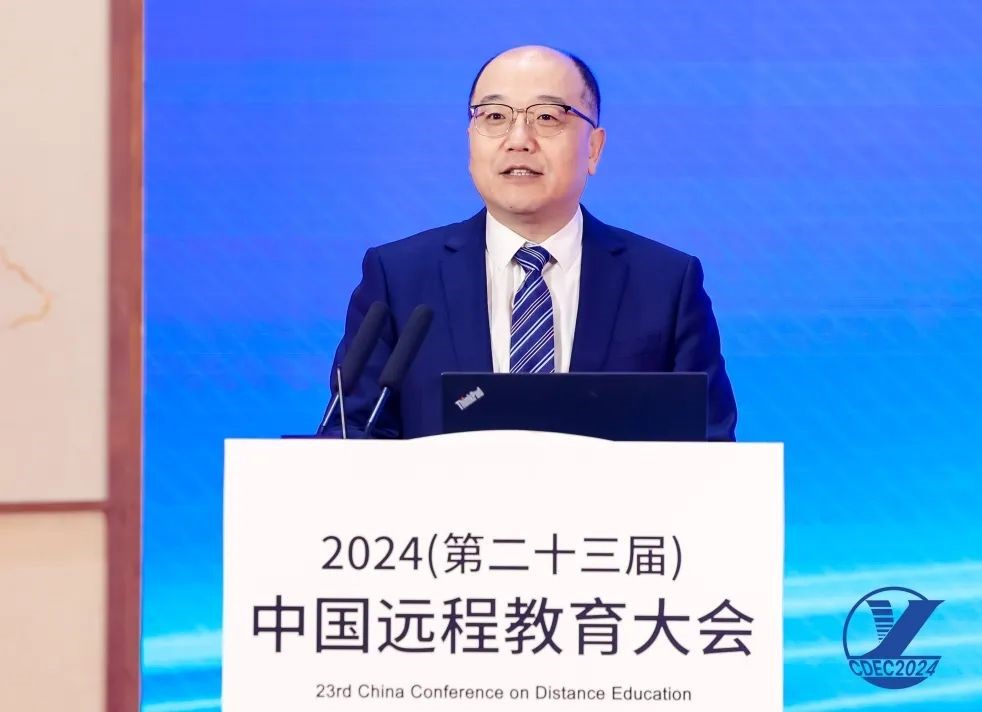
Xu Mingjun, vice secretary of the OUC Party Committee, presided over the opening ceremony.
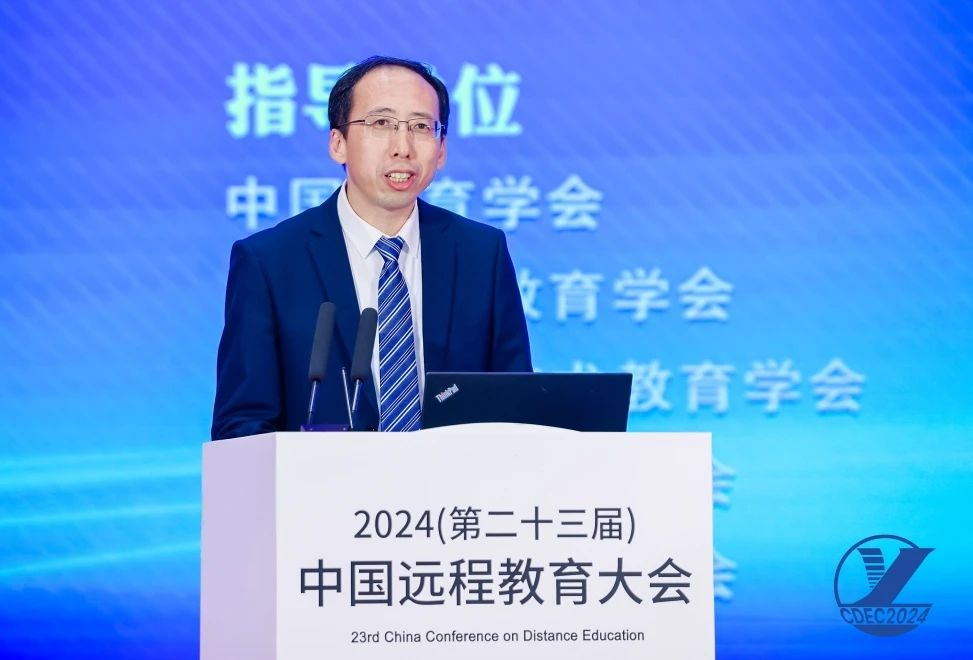
Feng Liguo, chairman and general manager of the OUC’s Publishing and Media Group, and president of Chinese Journal of Distance Education, presided over the main forum.
The conference also simultaneously hosted the 2024 Exhibition on New Technologies, Products, and Achievements in Education Digitalisation. Numerous enterprises showcased their achievements, presenting the attendees the latest results of China's education digital transformation in such areas as technology, platforms, and resources.
On 8 November, five parallel sessions were held on the following themes: high-quality development of continuing education in higher education, digital transformation of open education, digitalisation of vocational education and the construction of a modern vocational education system, the development of elderly education to empower the silver economy, and the transformation of lifelong education empowered by digital intelligent technologies. In addition, a non-degree education seminar and a visit to the EEO Education Future Learning Centre were also held concurrently.
Source: Chinese Journal of Distance Education